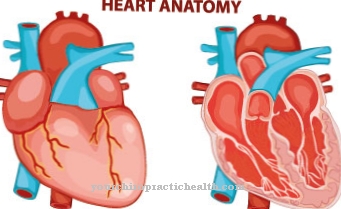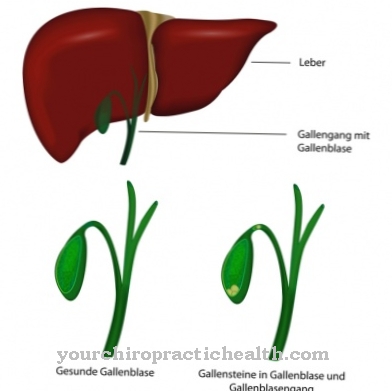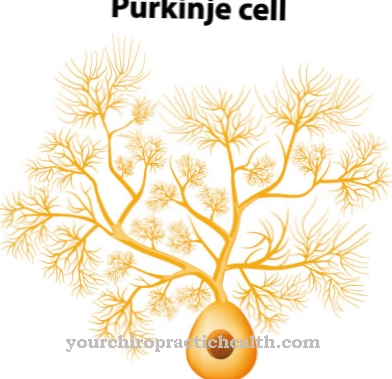The Rotavirus infection is a highly contagious disease that particularly affects children under the age of five. Rotaviruses cause diarrheal diseases, which are both very mild and cause serious complications. Rotavirus infections are notifiable in Germany.
What is rotavirus infection?

© Moonnoon - stock.adobe.com
A Rotavirus infection is caused by the so-called rotaviruses. The name "Rota" comes from the appearance of the viruses, because they are round like a wheel (lat. Rota = the wheel). The rotavirus infection belongs to the gastrointestinal diseases.
The viruses can cause very severe diarrhea with high fluid loss. This can lead to dangerous conditions, especially in babies and young children. Rotavirus infections are often fatal in third world countries. Of the 100 million children who fall ill each year in these countries, at least 600,000 are believed to die.
However, rotavirus infections can also affect adults. The infection often takes place via infected children. The disease is particularly dangerous for the elderly and rotavirus infections are very much feared in retirement homes. Just as it does in children, the disease can cause complications and death in the elderly and debilitated due to the high fluid loss.
causes
The cause of the Rotavirus infection are highly infectious viruses. A small amount of these rotaviruses is enough to trigger a disease. If they have attacked a body, they settle in the folds of the mucous membrane of the small intestine and multiply there. The diarrhea starts a short time later.
The viruses are excreted by sick people via the intestines. There are billions of viruses in every stool of infected patients. The pathogens are so highly contagious that they can survive for a very long time even without a host. They hang on toilets, on sinks and doorknobs, on toys and dishes, but also on the hands of sick people and are passed on in this way. One speaks here of smear infection.
The pathogen can also be transmitted via drinking water and food or via the water in swimming pools. If the disease has broken out in an institution such as a kindergarten or retirement home, it is extremely difficult to prevent infection among the people.
There are also different types of rotavirus, five different types occur in Europe. Once you have a rotavirus infection, you are only immune for a short time and only against this one type that has attacked you.
Symptoms, ailments & signs
Rotavirus infection is the most common diarrheal disease observed in children worldwide. The rotavirus is especially dangerous for babies and young children. In Germany, however, there are hardly any deaths associated with the disease. The highly contagious virus spreads particularly in the winter months.
After an infection, it takes about three days for the typical symptoms to appear. In addition to severe diarrhea and vomiting, there is also a fever. In adults, the disease is comparatively harmless. The infection initially manifests itself as light and watery diarrhea. However, the symptoms are getting worse.
Severe stomach pain is accompanied by nausea and vomiting. Children often have a high fever. The patients lack appetite and ingested food is vomited again. A rapid loss of fluid occurs particularly in small children. Much fluid is lost, especially due to the high fever.
Some of those affected also complain of symptoms that suggest flu. Rotavirus infection can be accompanied by a cough or aching limbs. The symptoms will subside after about five days. The virus remains highly contagious until about ten days after infection and is excreted in the stool.
Diagnosis & course
A Rotavirus infection can be very different. Weak people, old people, or young children often have more severe symptoms than older children or young adults. The disease usually begins with diarrhea that quickly becomes watery. There is also nausea, vomiting, cramp-like abdominal pain and fever.
Some patients have difficulty breathing. If those affected lose too much fluid due to the watery diarrhea, there is an acute risk of dehydration. The first signs of such an extreme lack of fluids in the body are headache, great thirst, dry mouth and parched mucous membranes. Patients do not have to pass any or very little urine.
A certain degree of confusion can also arise. A suspicion of a rotavirus infection diagnosis will not arise based on the nature of the symptoms alone, as they are similar to those of a harmless intestinal infection. However, if a large number of people get the disease at the same time and the course is more severe, the rotavirus infection is quickly suspected. Ultimately, however, only a stool examination in the laboratory can provide you with security.
Complications
Rotavirus infection is often associated with a high fever. If the body temperature rises to more than 41 ° Celsius, this can lead to life-threatening complications. Often, for example, there are circulatory problems and finally circulatory collapse, which must be treated in hospital in any case. The lack of fluids as a result of diarrhea and vomiting can lead to dehydration and thus to physical and mental deficits.
There is a mortal danger to children, the elderly and the sick. In infants, diarrhea due to rotavirus infection must be treated immediately by a doctor, as the loss of fluid quickly leads to dehydration. Treating rotavirus infection can also create complications. An infusion carries the risk of an allergic reaction or allergic shock.
When making the access, injuries can occur which can become inflamed and, in the worst case, trigger sepsis. If the port slips, the infusion can get into the surrounding tissue and cause severe soft tissue damage. Edema or thrombosis cannot be ruled out either. Finally, the prescribed painkillers and antipyretic preparations can trigger a number of side effects, interactions and allergic reactions.
When should you go to the doctor?
Rotavirus infection must always be treated by a doctor. This disease can lead to various complications that, in the worst case, can reduce the life expectancy of the person affected. For this reason, treatment by a doctor is essential and should be done immediately at the first sign of infection. A doctor should be consulted if the child suddenly has very severe diarrhea. This also leads to vomiting and a very high fever. In most cases, the affected children also experience severe stomach pain and nausea.
The intake of food is also very difficult for the child. If these symptoms occur, a doctor must be consulted. In most cases, rotavirus infection can be examined and treated by a pediatrician or a general practitioner. With an early diagnosis there are no complications and usually also a positive course of the disease. In the case of acute complaints, the hospital can also be visited directly.
Treatment & Therapy
Targeted treatment of the Rotavirus infection can not. To date, there is no drug that could kill the rotaviruses. So treatment consists in relieving the symptoms. Compensating for the lack of fluids in the body is particularly important.
Smaller children and elderly weakened people are usually hospitalized. You will be given fluids via an infusion. Frequent drinking is often sufficient for normally healthy adults. Unless they have severe nausea and vomiting so that they cannot hold on to water they have drunk. Then an infusion will also provide hydration. The infusions contain mineral salts that are important for the body and that were excreted by the diarrhea and are now missing.
If the disease is milder, no further measures are necessary. Infants can continue to be breastfed, while toddlers and adults should drink plenty of water or herbal teas. Sugary drinks should be avoided during rotavirus infection. Abdominal pain can be relieved by gentle massages and putting on a hot water bottle.
You can find your medication here
➔ Medication for diarrheaprevention
Well-developed hygiene measures against the Rotavirus infection. Frequent hand washing, especially after going to the toilet and before eating, is important. In addition, bathrooms and toilets should be adequately cleaned. In the meantime, a vaccine has also been developed that can be used in babies as early as six weeks.
Aftercare
Rotavirus infection not only weakens the gastrointestinal tract, but the entire organism. Targeted aftercare can sustainably support the regeneration of the body. Ideally, it should be discussed with the family doctor or internist. The cooperation of the patient is of crucial importance. The greatest possible protection is just as important in aftercare as a certain nutritional discipline.
The weakened body can recover particularly well with enough sleep. Stress, both privately and professionally, should also be avoided in the best possible way in aftercare. In addition, there is a sufficient amount of water to drink, which supports the gastrointestinal tract, circulation and metabolism equally. Here, carbon dioxide, acid (for example in orange juice), coffee and of course alcohol should ideally be avoided.
The diet should not put additional strain on the intestines, which are weakened by the disease. It is best to eliminate fat and bloating from the aftercare phase. Probiotics and yogurt are often useful because they help rebuild the intestinal flora, which can be disturbed by the disease. Fruits and vegetables, if they don't puff or irritate, are also helpful.
They replace vitamins, minerals and trace elements that were washed out of the body by the diarrhea caused by the rotavirus infection. Physical activity such as a walk can stimulate the circulation weakened by a lack of fluids, but should be done in a dosed manner at the beginning.
You can do that yourself
The symptoms of rotavirus infection can be alleviated by self-help, but it needs treatment by a doctor if it concerns pregnant women, the elderly or small children or if the loss of fluid leads to severe circulatory problems. Self-help in everyday life with a rotavirus infection essentially means relieving the symptoms, since the disease is usually over after two days if the disease progresses normally.
Diarrhea and vomiting are accessible to self-help by consistently compensating for the loss of fluids that they cause. Still water and unsweetened herbal teas are ideal drinks in this context. In addition, a hot water bottle or a hot towel on the stomach can provide relief from stomach cramps. Remedies for diarrhea are not optimal, as diarrhea is a measure of the body to flush the infectious germs out of the intestines as quickly as possible. Light foods such as mashed potatoes are foods that are best tolerated after a possible food abstinence.
Self-help in everyday life in a family also means protecting the other family members, since the rotavirus is a highly contagious germ. Disinfection of the shared toilet after using the toilet is strongly recommended. Washing hands around the toilet is mandatory when infected with the rotavirus, as the risk of infection with this disease is very high and hygiene is therefore very important.

.jpg)


.jpg)

.jpg)




















